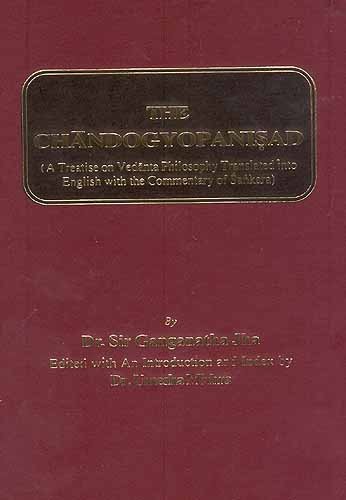Chandogya Upanishad (Shankara Bhashya)
by Ganganatha Jha | 1942 | 149,749 words | ISBN-10: 8170842840 | ISBN-13: 9788170842842
This is the English translation of the Chandogya Upanishad, an ancient philosophical text originally written in Sanksrit and dating to at least the 8th century BCE. Having eight chapters (adhyayas) and many sub-sections (khandas), this text is counted among the largest of it's kind. The Chandogya Upanishad, being connected to the Samaveda, represen...
Section 6.9 (ninth khaṇḍa) (four texts)
Upaniṣad text:
‘Just as, my dear, the bees make honey, by collecting the juices of many distant trees, and then reducing them to one unit in the form of one juice.’—(1)
Commentary (Śaṅkara Bhāṣya):
You ask—how is it that people being merged into Being day after day do not know that they have become merged into Being?—Listen to an illustration:—‘Just as, in the ordinary world, O my dear, ‘makers of honey’—Bees make Honey—prepare it, being entirely absorbed in the work;—how?—by collecting the juices of many distant trees—trees in varying conditions and in various places and then reducing them to one unit—in the form of one juice, Honey—i.e. they reduce the various juices to the state of the Honey.’—(1)
Upaniṣad text:
‘And there, as those juices have no discrimination, such as I am the juice of this tree; I am the juice of that tree; in the same manner, my dear, all these creatures having merged into Being, do not know that we are merging into Being’.—(2)
Commentary (Śaṅkara Bhāṣya):
When those juices have been reduced to unity in the form of Honey, then, in the honey, they have no discrimination,—how?—that I am the juice of this—mango or jack-fruit tree;—in the way that there is in the world, when several sentient persons collect together in an assembly, they have the discrimination that I am the son of this man, I am the grandson of that man,—and having got at this discrimination, they do not become mixed up. In the case of Honey, however, there is no such discrimination; though the juices have been collected from several trees, and have taste variously as sweet, acid, bitter, pungent and so forth,—and they have been collected in one—the form of Honey, they are no longer able to be discriminated as sweet or bitter etc. This is the sense of the illustration.—Just as, in the case of the illustration cited, so, my dear, all these creatures being merged—day after day—into Being,— during Deep Sleep, at death and at Cosmic Dissolution,—do not know,—would not know,—that we are becoming— or become—merged into Being,—(2)
Upaniṣad text:
‘Whatever these creatures are here—a tiger, or a lion, or a wolf, or a boar, or a worm, or an insect, or a gadfly, or a mosquito,—that they become again.’—(3)
Commentary (Śaṅkara Bhāṣya):
Because, without knowing that they arc Being,—they merge into Being,—therefore, in whatever,—animal—species—such as, the tiger and the like,—they have been born in, in this world,—each of them knowing himself as a tiger or a lion, so forth,—they become impressed with the tendencies of past cognitions and actions, and after having merged into Being (at death), they are born again in that same condition with the same tendencies; and returning from Being, they become a tiger, or a lion, or a wolf, of a boar, or a worm, or an insect, or a gadfly, or a mosquito,—whatever they are—i.e. were in this world previously,—that same they become again,—on return (re-birth); even though the two consecutive births of an evolving creature be separated by an interval of millions of time—cycles, the tendencies imprinted upon it during the preceding life do not cease to exist (and affect his later birth); as has been declared in another—Vedic Text—‘Births are in accordance with knowledge.’—(3)
Upaniṣad text:
‘Now, that which is this Subtle Essence,—in That has all this its Self; That is the Self; That is the True; That thou art; O Śvetaketu’—‘Revered Sir, please explain this to me, again.’—‘Be it so, my boy’, he said.’—(4)
Commentary (Śaṅkara Bhāṣya):
That Being wherein having entered, creatures are born again,—and wherein having entered in its subtle form of the self, those creatures do not return who are firm in their conviction regarding the Self,—that is the Subtle Essence etc., etc.,—as already explained above.
“In ordinary life, when a man rising from sleep, in his house, has gone to another village, he is conscious of his come away from his home; in the same way, why is it that the creatures who have been born after having merged in Being, are not conscious of having come from Being? Please explain this to me again”.
Being thus addressed, the father said—‘Be it so, my boy.’—(4)
End of Section (9) of Discourse VI.
